|
Related
FAQs: Cardinals 1, Cardinals 2, & FAQs on: Cardinal ID, Cardinal
Behavior, Cardinal Compatibility,
Cardinal Selection, Cardinal Systems, Cardinal Feeding, Cardinal Disease, Cardinal Reproduction, Banggai Cardinals, Banggai ID, Banggai
Behavior, Banggai
Compatibility, Banggai
Selection, Banggai Systems,
Banggai Feeding, Banggai Disease, Banggai Reproduction,
Related Articles: Cardinalfishes of
Indonesia,
/A Diversity of Aquatic
Life
Cardinalfishes,
Family Apogonidae, Pt. 1 To: Part 2,
Part 3,
Part 4,
Part 5,
Part 6 |
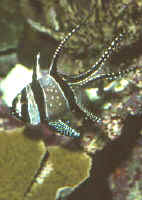
|
|
By Bob Fenner
|
Pterapogon kauderni
|
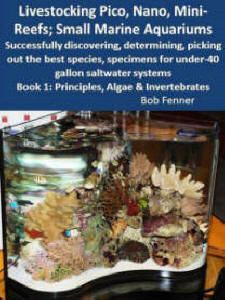 |
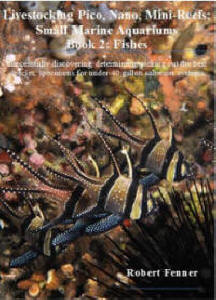 |
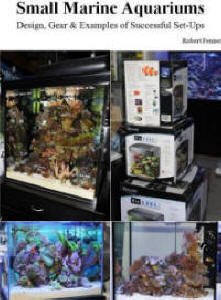 |
Small Marine Aquariums
Book 1:
Invertebrates, Algae
New
Print and
eBook on Amazon:
by Robert (Bob) Fenner |
Small Marine Aquariums
Book 2:
Fishes
New
Print and
eBook on Amazon: by Robert (Bob) Fenner |
Small Marine Aquariums
Book 3:
Systems
New
Print and
eBook on Amazon:
by Robert (Bob) Fenner |
It's a shame that Cardinalfishes are so often passed
over as marine aquarium specimens. It's my guess that their
odd-shapes, retiring conduct, and large, all-seeing eyes must lead
aquarists to consider this group as being too 'touchy' for
captive use. Admittedly, the success rate in keeping these fishes
is dismal; but for explainable, correctable
reasons.
Cardinalfishes occupy some of the same niches on the
reef and in aquariums as the damsels (family Pomacentridae);
biologically, they're principal forage fishes for piscivores;
commercially they're plentiful, easily captured, and transport
well; resulting in their being relatively inexpensive to acquire.
Securing decent specimens, maintaining them in a small
school, and granting them a few provisions will reward you with hardy,
interesting and long-term specimens.
Systematics:
Cardinalfishes, family Apogonidae
("Ap-oh-gahn-id-ee") are members of the largest Order of
fishes, the Perciformes. They are one of the largest families of fishes
with about 27 genera and 250 species. The Cardinals are further
subdivided into two families (the deepwater Epigonidae) and
sub-families depending on whose taxonomic scheme you favor. Hobbyists
are generally offered a half dozen members of the largest genus
Apogon and the Pajama (S. orbicularis) and Blackbelt
Cardinals of the genus Sphaeramia.
Many Cardinalfishes are reddish in color (hence their
common name) mixed with silver and white, though most species are
yellow, silvery and black. All have large eyes, and are nocturnal;
hiding in crevices or beneath ledges by day (typically with
Squirrelfishes, Bigeyes and sweepers). These are mostly shallow water
fishes, found from the surface to about 100 meters.
Species of Interest/Use to
Aquarists:
Genus Apogon:
| Apogon atrodorsatus Heller & Snodgrass
1903, the Blacktip Cardinalfish. To three and a half inches.
Southeast Pacific; Cocos, Malpelo and Galapagos islands. Like most
apogonids, hides near ledges, overhangs by day, feeds at night.
Galapagos pic. |
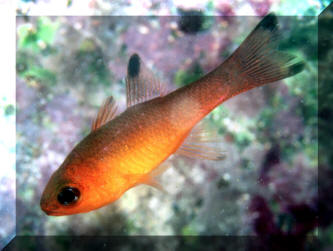
|
| Apogon aureus (Lacepede 1802), Now, Ostorhinchus
aureus the Ring-Tail Cardinalfish. |
| Apogon binotatus (Poey
1867), the Barred Cardinalfish. West-Central Atlantic; Florida to
Venezuela. To four inches in length. Bonaire pic. |
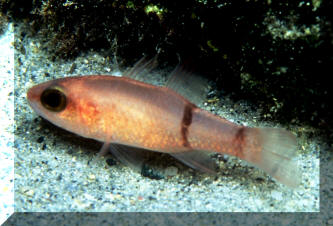
|
| Apogon bandanensis (Now Nectamia?) Bleeker
1854, the Bigeye Cardinalfish. West-Pacific in distribution (this
one in Fiji). To four inches in length. |
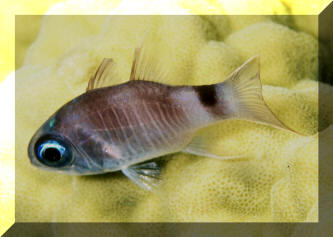
|
Bigger PIX:
The images in this table are linked
to large (desktop size) copies. Click on "framed" images
to go to the larger size. |
|
%20MD.JPG)
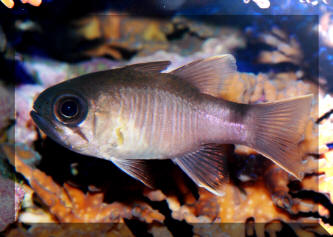
|
| Apogon cavitensis (Now in the genus Ostorhinchus) |
| Apogon compressus (Now in the
genus Ostorhinchus) |
| Apogon cookii (Now in the genus
Ostorhinchus) |
| Apogon cyanosoma (Now in the
genus Ostorhinchus) |
| Apogon doederleini (Now in
the genus Ostorhinchus) |
| Apogon fraenatus (Now in the
genus Pristiapogon) |
| Apogon hartzfeldii (Now in the
genus Ostorhinchus) |
| Apogon hoevenii (Now in the genus
Ostorhinchus) |
| Apogon leptacanthus (Now in the
genus Zoramia) |
| Apogon maculatus (Poey 1860), Flamefish.
Western Atlantic, Massachusetts to Brazil. To four or so inches in
length. Here are images of the species in the Bahamas during the
day and night. 2-60 feet. |
 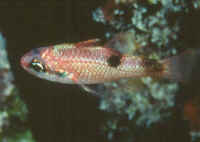
|
Bigger PIX:
The images in this table are linked
to large (desktop size) copies. Click on "framed" images
to go to the larger size. |
|
%20MD.JPG)
|
| Apogon maculiferus (Now in
the genus Ostorhinchus) |
| Apogon margaritophorus (Now in
the genus Ostorhinchus) |
| Apogon menesemus (Now in the
genus Pristiapogon) |
| Apogon nanus (Now in the genus Ostorhinchus) |
| Apogon neotes (Now in the genus Ostorhinchus) |
| Apogon nigrofasciatus
(Now in the genus Ostorhinchus) |
| Apogon pacificus Herre 1935, the Pink
Cardinalfish. Sea of Cortez to Peru. Rock and coral reefs. To 10
cm. in length. Costa Rica (Pacific side)
2011 |

|
Bigger PIX:
The images in this table are linked to large
(desktop size) copies. Click on "framed" images to go to
the larger size. |
|
%20MD.JPG)
%20MD.JPG)
|
| Apogon phenax Bohlke & Randall 1968, the Mimic
Cardinalfish. Tropical W. Atlantic. To three inches. Light red overall w/
two dark/brown body bars posteriorly. Bonaire 2019. |
Not
|
| Apogon planifrons Pale Cardinalfish. Pale,
pearlescent body; two body bars, one behind second dorsal and broader one on
caudal peduncle. Roatan 2019 night dive. |
%20MD.JPG)
|
Bigger PIX:
The images in this table are linked
to large (desktop size) copies. Click on "framed" images
to go to the larger size. |
|
%20MD.JPG)
|
| Apogon quadrisquamatus Longley 1934,
Sawcheek Cardinalfish. Western Pacific; Florida to Venezuela. To 7
cm. in length. Bonaire pic at night. |
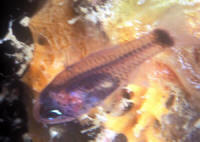
|
| Apogon robinsi Roughlip Cardinalfish. Dark reddish
areas along rear dorsal, anal and upper and lower margins of caudal. Roatan
2017 |
%20MD.JPG)
|
| Apogon sealei (Now in the genus Ostorhinchus) |
| Apogon townsendi (Breder
1927), the Barred Cardinalfish. West-Central Atlantic; Florida to
Venezuela. To 6.5 cm. in length. Sometimes rear bars are joined
together. Bonaire night pic. |
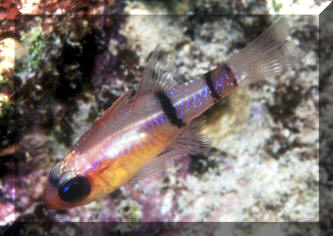
|
Bigger PIX:
The images in this table are linked to large (desktop size) copies.
Click on "framed" images to go to the larger
size. |
|
%20MD.JPG)
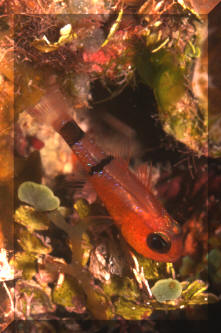
|
Bigger PIX:
The images in this table are linked to large (desktop size) copies.
Click on "framed" images to go to the larger
size.
An unidentified Cardinalfish species in captivity in
aquarium in Sacramento, CA. |
|
%20MD.jpg)
|
To: Part 2,
Part 3,
Part 4,
Part 5,
Part 6
 |
 |
 |
Small Marine Aquariums
Book 1:
Invertebrates, Algae
New
Print and
eBook on Amazon:
by Robert (Bob) Fenner |
Small Marine Aquariums
Book 2:
Fishes
New
Print and
eBook on Amazon: by Robert (Bob) Fenner |
Small Marine Aquariums
Book 3:
Systems
New
Print and
eBook on Amazon:
by Robert (Bob) Fenner |
|
|

